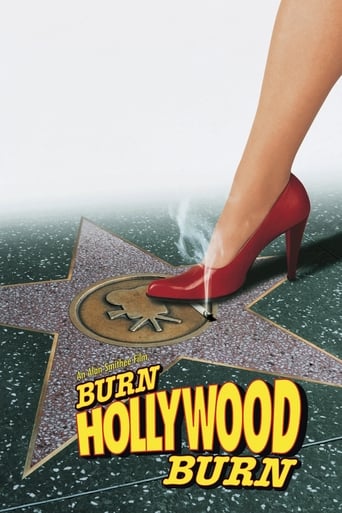The Movie Hollywood Doesn't Want You to See.
"An Alan Smithee Film: Burn, Hollywood, Burn" is a satirical comedy released in 1998, produced by Cinergi Pictures and Hollywood Pictures. Directed by Arthur Hiller and credited to the infamous pseudonym Alan Smithee, the film takes a biting look at the inner workings of the Hollywood film industry. The plot follows a young director, played by Ryan O'Neal, who is forced to disown his own film due to studio interference, leading him to take drastic measures to sabotage it. The film's use of the Alan Smithee name, traditionally used by directors to disavow a project, adds a meta layer to its critique of the industry's creative constraints. The cast of "Burn, Hollywood, Burn" features a mix of established and up-and-coming actors, including Ryan O'Neal, Coolio, and Eric Idle. Their performances contribute to the film's comedic tone, with Coolio's portrayal of a struggling actor and Eric Idle's role as a cynical producer standing out. The film's script, penned by Joe Eszterhas, is filled with sharp wit and insider references that poke fun at Hollywood's excesses and the often absurd demands placed on filmmakers. Despite its humor, the movie also touches on serious themes such as artistic integrity and the struggle for creative control. Upon its release, "Burn, Hollywood, Burn" received mixed reviews from critics, who praised its ambition but criticized its execution. Some felt that the film's satire was too heavy-handed, while others appreciated its bold attempt to expose the industry's flaws. The movie's use of the Alan Smithee pseudonym became a point of contention, as it was seen by some as a gimmick that overshadowed the film's message. Despite the controversy, "Burn, Hollywood, Burn" remains a notable entry in the genre of Hollywood self-satire, offering a unique perspective on the challenges faced by filmmakers. In the years following its release, "An Alan Smithee Film: Burn, Hollywood, Burn" has gained a cult following among cinephiles who appreciate its unapologetic critique of the film industry. While it may not have achieved mainstream success, the movie's legacy lies in its willingness to confront the often unspoken realities of Hollywood. As a product of Cinergi Pictures and Hollywood Pictures, it serves as a reminder of the tensions between artistic vision and commercial pressures that continue to shape the world of cinema.
*If our moderation approves your version, it will be replaced and you will be credited as the text author.
Year1998
Budget10000000$
Runtime86 min
Revenue45779$
GenresComedy
Production countriesUnited States of America


